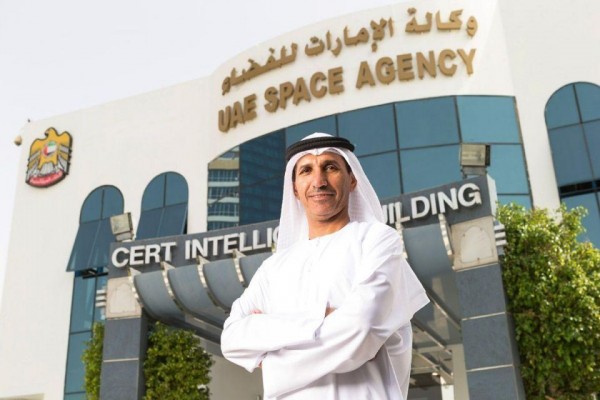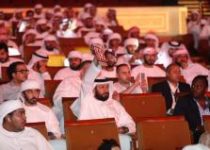Preparations are in full swing to launch KhalifaSat, the first satellite fully built in the UAE by a team of highly qualified Emirati engineers, into orbit before the end of the year from the ground station in Japan aboard the rocket, H-IIA, revealed Director-General of the UAE Space Agency.
”The UAE Space Agency is planning to launch another satellite dedicated for educational and research purposes in the coming few months,” Dr. Mohamed Nasser Al Ahbabi, said in an interview with the Emirates News Agency, WAM.
According to him, when these launches are completed, the UAE will have ten multi-purpose satellites, raising the UAE investment in the space sector to AED22 billion.
“KhalifaSat marks a critical milestone in the nature and form of the UAE’s investment in the space industry. KhalifaSat is a source of inspiration for Emirati generations because it is the first satellite to be fully manufactured in the UAE. It is considered one of the first productions of the advanced technology industry in the UAE. This satellite was designed and manufactured by a large team of qualified Emirati engineers. KhalifaSat will usher the UAE into the space manufacturing sector,” he stated.
KhalifaSat will provide high-quality detailed imagery for a variety of uses. The images will meet the needs of government organisations and private sector enterprises locally and globally.
”KhalifaSat clearly indicates how the UAE leadership thoroughly plans and looks at the space sector as one of the most promising industries in the future,” he said.
Revealing the UAE’s intention to formulate a pan-Arab alliance for space, Dr. Al Ahbabi said, “We have held coordinating and consultative meetings with representatives of specialised agencies and universities in six Arab countries to lay the groundwork and kernel of the alliance, whose prime mandate is to assist Arab countries to develop their space sector and establish national space agencies as a prelude to create a space science knowledge transfer mechanism and launch national space strategies.”
On the latest developments regarding Hope Probe, Dr. Al Ahbabi said that work is progressing as scheduled on sending the first Arab and Islamic probe to Mars from Japan by 2020 to reach the red planet by 2021, in celebration of the golden jubilee of the union of the UAE.
”The Hope Probe is one of the vital projects in the global space sector and it opens a new window of hope for young Arab scientists to restore the Arab and Islamic prominence and leadership. The project provides an ideal platform for education, training and transfer of expertise, knowledge and modern technology.
”The programme is fully funded and supervised by the UAE Space Agency, while the probe is being developed by the Mohammed bin Rashid Space Centre, MBRSC, in collaboration with international partners. The objectives of the mission include building Emirati human resources that are highly qualified in space technology, developing knowledge, scientific research and space applications to benefit mankind.
“Other goals of the mission include establishing a sustainable knowledge-based economy, promoting diversification and encouraging innovation, elevating the UAE’s status in the space race and further widening benefits. The mission will help to promote the UAE’s efforts in scientific explorations, and to build international partnerships in the sector to promote the position of the UAE.
”The programme provides the potential for the UAE to write a new chapter of its success story,” he further stated.
The Director of the UAE Space Agency indicated that the UAE is aspiring to become a regional centre for space science and technology by forging constructive partnerships with international organisations.
”So far, we have signed 25 agreements with major international space agencies and institutions. We are planning to conclude two memoranda of understanding shortly,” he disclosed.
An official report obtained by WAM states that investment in space technology and industry will have a positive impact on the national economy and help the country build a base of highly educated, qualified and trained professionals including astronauts, space specialists, experts, planners and engineers.
The space industry in the UAE is one of the promising sectors as it focuses on implementing space technologies in the daily life of people and allows them to get rich knowledge of the Earth and the universe. According to the report, the UAE investments in the space technology rose from AED20 billion in 2015 to more than AED22 billion in the first half of 2018 while the global aerospace industry is estimated at US$300 billion.
The global space industry growth rate is expected to reach 8 percent per annum. The UAE has a pioneering experience in the space field as they launched four Emirati satellites that are currently orbiting around the Earth.
This encourages the wise leadership of the UAE to move forward towards the adoption of strong, innovative and promising investment areas that would boost the economy by diversifying the country’s resources and incomes.
”The space sector will take centre stage in the UAE development plans in the next 50 years with the aim of increasing production, building a knowledge-driven economy and strong base for creativity and innovation. Space industries, including satellites and their multiple services, will be one of the main driving forces to raise economic growth in the UAE,” the report said.
The UAE’s plan to build the first city on Mars as part of the 2117 Mars project in collaboration with specialised international organisations and scientific institutes will give the UAE the upper hand and lead in developing a lifestyle in Mars As part of a 100-year national programme, the UAE will develop a plan to prepare national cadres that can achieve scientific breakthroughs to facilitate the transport of people to the red planet over the next decades. The Mars 2117 Project will involve scientific research programmes to nurture national cadres specialised in space sciences at universities in the UAE.
It will also entrench a passion for space in younger generations. The project will be associated with research themes featuring the exploration of transportation means, energy and food on Mars. It will also try to find faster transportation methods for travelling to and from Mars.







